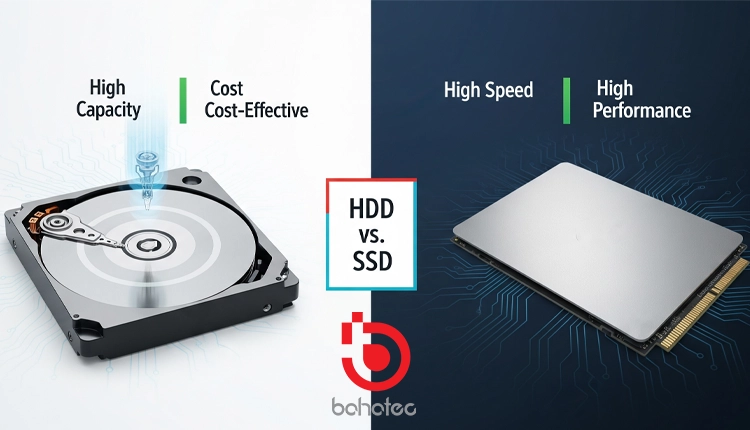HDD vs. SSD: The Fundamental Differences
A server’s storage drives are one of its most important components, as they significantly influence performance, reliability, and cost. When choosing storage for an HPE server, the decision often comes down to two primary technologies: Hard Disk Drives (HDDs) and Solid State Drives (SSDs). This comprehensive guide will help you understand the key differences between HPE server HDDs and SSDs, enabling you to select the best option for your business needs. We will cover their core technology, performance, reliability, cost, and ideal use cases to ensure you make an informed decision.
How They Work
HDDs use spinning magnetic platters and a mechanical read/write head to store and retrieve data. Think of it like a record player. The head moves across the spinning disk to find the data. This mechanical nature makes them more susceptible to physical shock and limits their speed.
SSDs, on the other hand, use NAND flash memory to store data electronically. They have no moving parts, which makes them faster, more durable, and completely silent.
Performance: Speed and Latency
This is where the biggest difference lies. Because of their mechanical nature, HDDs have significant latency, meaning there’s a delay between requesting and receiving data. Their sequential read/write speeds are decent, but their Input/Output Operations Per Second (IOPS) are much lower than SSDs. This low IOPS is a major bottleneck for applications that require fast, random access to data, like databases or virtual machines.
SSDs have near-zero latency and incredibly high IOPS. They can handle a massive number of read/write requests simultaneously, making them ideal for high-performance computing tasks. An HPE server equipped with SSDs can boot faster, load applications quicker, and handle intense workloads with ease.
Reliability and Durability
HDDs are prone to failure from physical shocks and vibrations due to their moving parts. In a server environment, this can be a serious concern, particularly in high-vibration data centers. The Mean Time Between Failures (MTBF) is a key metric, and while HPE HDDs are built to a high standard, they cannot match the durability of SSDs.
SSDs are highly durable because they have no moving parts. They are resistant to shocks and vibrations. However, they have a limited number of write cycles, a metric known as Terabytes Written (TBW) or Drive Writes Per Day (DWPD). HPE enterprise SSDs are designed with advanced wear-leveling algorithms to distribute writes evenly and maximize their lifespan, making them extremely reliable for server use.
Cost and Capacity
This is the traditional strong suit of HDDs. They offer a much lower cost per gigabyte than SSDs. For large-scale storage where performance is not the primary concern, HDDs are a very cost-effective solution. This makes them suitable for backup servers, archival storage, and large data warehouses.
SSDs are significantly more expensive upfront. However, their superior performance often justifies the higher cost, especially when considering the potential for increased productivity and reduced latency-related bottlenecks. Over time, the price gap between HDDs and SSDs has been shrinking, but HDDs still hold the advantage for raw capacity at the lowest price point.
Choosing the Right Drive for Your Business
Your choice of drive should align with your specific business needs and budget. Here’s a breakdown of ideal use cases.
When to Choose HPE Server SSDs
- High-Performance Computing (HPC): For scientific research, simulations, and data analytics that demand rapid access to data.
- Databases: Relational databases (SQL, Oracle) and NoSQL databases (MongoDB) that rely on fast I/O and low latency.
- Virtualization: Running multiple virtual machines (VMs) on a single server, where SSDs can dramatically improve VM responsiveness and reduce boot times.
- Web Servers and E-commerce: For websites with heavy traffic that need to serve content quickly and handle a high volume of requests.
- Transactional Workloads: Any application where real-time transactions are critical, such as financial trading platforms.
When to Choose HPE Server HDDs
- Mass Storage and Archival: Storing large amounts of data that are not accessed frequently, such as video archives, security footage, and historical records.
- Backup Servers: Creating backups of data where the primary goal is storage capacity and long-term retention rather than speed.
- File Servers: For businesses that primarily store and share large files (e.g., design files, media assets) that are accessed sequentially.
- Cost-Sensitive Deployments: When budget is a major constraint and a large storage capacity is needed without the need for high-speed performance.
Conclusion: A Hybrid Approach
Many businesses find that a hybrid storage solution provides the best of both worlds. You can use a combination of SSDs and HDDs in a single HPE server. For example, you can use SSDs for your boot drive and frequently accessed “hot” data (e.g., operating systems, databases) and HDDs for “cold” data that is used less often (e.g., backups, archives). HPE server management software, like HPE iLO, can help you manage and optimize these storage configurations to maximize performance and efficiency.
Ultimately, the decision depends on your application’s requirements. If speed and responsiveness are critical, investing in HPE SSDs will provide a significant return on investment. If your primary need is large-scale, cost-effective storage, HPE HDDs are the right choice.
You can purchase these HPE server hard drives and SSDs, both original and with a warranty, from our company, Bahatec, in Dubai. We guarantee that all our products are authentic and backed by a comprehensive warranty to ensure your server’s reliability and performance.


